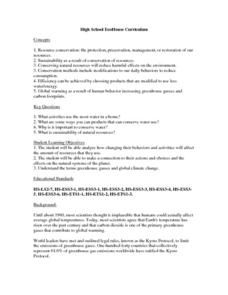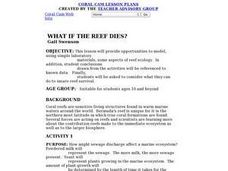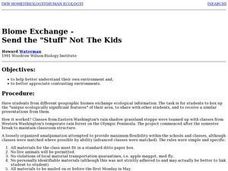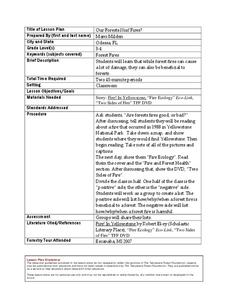Curated OER
Water Monitoring Vocabulary
As the title implies, this is a list of vocabulary terms relating to water monitoring. If your ecology class is learning about how to test water quality, this will be an appropriate reference sheet for them. As a bonus, if you live in...
Curated OER
Galileo's Thermometer: Measuring the Density of Various Unknown Liquids
Sprouting scientists explore the concept of density by making mass and volume measurements for five different liquids. From these measurements, they calculate densities. They apply their learning to explain Galileo's thermometer works...
Curated OER
Adaptation and Diversity on Sheffield Island
Written for an exploration of shoreline ecosystems on Sheffield Island, this gives ecology or marine biology buffs a hands-on experience. Using GPS or visual triangulation techniques, they lay transect lines on a high and a low energy...
Curated OER
Everybody Needs a Little Sunshine
Three activities introduce upper elementary ecologists to photosynthesis and food webs. In the first, an experiment is set up to determine how plants respond to different types of light. In the second, they connect organism cards with...
Curated OER
Renewable Energy Sentences
Students construct sentences using nouns and verbs from a "renewable energy" word bank. In this cross curriculum ecology and sentence structure grammar and mechanics lesson plan, students listen to the book Our Earth: Clean Energy by...
Curated OER
What's Cooking?
Young scholars investigate solar energy by making sun tea. In this ecology and solar energy lesson plan, students prepare traditional tea and "sun" tea, then record and graph data comparing color, clarity, smell and taste.
Curated OER
Up the Down Tree House
Students investigate the decomposition process. In this ecology lesson, students participate in a play, "Up the Treehouse" where the main idea focuses on a decomposing tree and how food chains are effected by decomposition. After the...
Curated OER
Biodiversity Debate - Stream Side Science
Role play community members who are both for and against the construction of a dam. Research the pros and cons and then hold a classroom debate. This activity ideally follows a series of stream studies, links to which are included. Use...
Curated OER
Down in the Dumps
After an introduction to municipal sludge, middle school ecologists consider the pros and cons of dumping in the Hudson River Canyon. The class is split into two groups: one to debate in favor or dumping and one to debate against the...
Curated OER
Snapshot Day Definitions and Activities
Here is a document full of teaching notes on water quality and bodies of water that you can use in your ecology curriculum. It has information specific to the Hudson River area, but can easily be adapted to any local body of water....
Curated OER
High School EcoHouse Curriculum
How has the level of carbon dioxide changed over recent years, and what is contributing it? Groups work together to research and present their findings in a creative way. Also built into the lesson is a visit to a sustainable house, but...
NASA
Biology Training Conclusion
Gravity is just one consideration when determining human habitability on a new planet. The lesson connects four different units and starts with connecting the various systems: planetary systems, human body systems, etc. After scholars...
National Wildlife Federation
Green Green Revolution
School budgets don't have a lot of extra money, so when students propose saving the district money, everyone jumps on board. The first lesson in the series of 21 introduces the concept of an energy audit. Scholars form an eco-action team...
Curated OER
Something Rotten in West Bloomfield!
Student groups seek a possible ecological problem in the West Bloomfield area then either photograph or videotape the problem. They investigate how to measure the extent of the problem and do it.
Curated OER
Prairie Conservation
Fourth graders conduct online research related to prairie conservation, prairie plants and animals, and the ecological system of the prairie.
Curated OER
Artificial Reef
Students conduct online research to determine how and why artificial reefs are created, and investigate how they benefit marine life and the marine ecology.
Curated OER
What If the Reef Dies?
Learners complete four activities to investigate how reef ecology can change. They perform experiments to show how sewage discharge can affect a marine ecosystem, look at substances that don't dissolve in water, examine wave action...
Curated OER
Biome Exchange - Send the "Stuff" Not The Kids
Students exchange ecological information with students from different geographic biomes. They box up the "unique ecologically significant features" of their area, send the box to another class in another area and then receive a similar...
Curated OER
Forest Canopies: View from the Top
Students examine the economic and ecological benefits of forest canopies. They read and discuss an article, answer questions, conduct research, draw field sketches of a canopy ecosystem, conduct a feasibility study, or prepare tourist...
Curated OER
Getting into Hot Water
Students discuss the effect of global warming on bodies of water after reading "An Icy Riddle as Big as Greenland" from The New York Times. Students work in groups to research topics related to global warming and Greenland's ecology...
Curated OER
Our Forests Need Fires?
Students consider how forest fires are both damaging and beneficial to forests. In this earth science instructional activity, students are read the book Fire! In Yellowstone by Robert Ekey and watch "Fire Ecology" and "Two Sides of...
Curated OER
Pika Chew
Learners work in collaborative teams with specific roles, use the Internet to research the behavior and ecology of pikas, make predictions about survival rates of pikas in different habitats and organize their data in graphs.
Curated OER
Earth: The Food We Eat, The Seeds We Sow
Students explore the importance of seed diversity for cultural and ecological stability/health. They discover what an heirloom seed is and why they are important to conserve.
Curated OER
Corals & Coral Reefs
Students describe a coral reef, how it is formed and its inhabitants. They explain the ecological and economic importance of coral reefs and discuss its present-day threats. Lesson contains adaptations for all levels.
Other popular searches
- Population Ecology
- Animal Ecology
- Human Ecology
- Behavioral Ecology
- Ecology Principles
- Community Ecology
- Pond Ecology
- Ecology Organizations
- Global Ecology
- Ecology Ethics
- Ecology Food Webs
- Ecology and Plants























